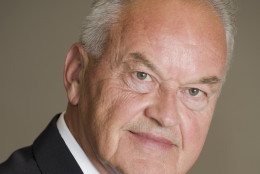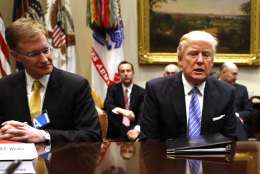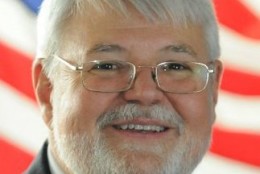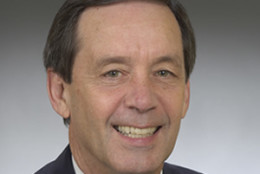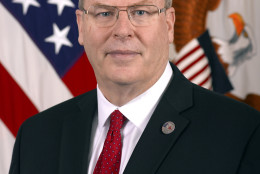Hiring freeze
-
The government's top ethics official says President Trump still hasn't provided sufficient documentation of his plan to divest his business holdings.
January 24, 2017 -
Senior Correspondent Mike Causey says some current and future feds could benefit from the current situation.
January 24, 2017 -
President Donald Trump signed a memorandum Monday implementing a federal hiring freeze. It prevents agencies from making most new hires and prevents them from filling vacant positions. It does not apply to military or national security positions.
January 23, 2017 -
For J. David Cox, national president for the American Federation of Government Employees, the outcome of the 2016 presidential election came down to "bread and butter issues." And those are challenges that his union, which represents more than 309,000 federal employees, will rally for with the start of the new administration as well.
December 07, 2016 -
Suppose, after inauguration, President Donald Trump did impose a federal hiring freeze, easier firing and no more union work during regular hours. What might that effect be after 100 days? For one perspective, Federal Drive with Tom Temin turn to Bob Tobias, professor in the Key Executive Leadership Program at American University.
December 06, 2016 -
Feet cold? Put on a hat. If anything, we're entering a golden age for federal HR.
December 01, 2016 -
Larry Allen, president of Allen Federal Business Partners, Lohfeld Consulting's Lisa Pafe and Washington Technology's Nick Wakeman join host Mark Amtower for a wide ranging discussion of what contractors are facing during the transition to a new administration. November 21, 2016
November 21, 2016 When President-elect Donald Trump takes office in January 2017, what does that mean for the federal government? Find out on this week on Fed Access when Government Executive Staff Correspondent Eric Katz joins host Derrick Dortch. November 18, 2016
November 10, 2016-
As of last week, all of the Defense Department components that fall under the direct control of the Office of the Secretary of Defense (OSD) are barred from hiring any new civilian employees.
March 28, 2016 -
The Internal Revenue Service has frozen or severely restricted all new hiring for the past several years in response to budget cuts. But IRS Commissioner John Koskinen told senior agency officials to lift the freeze next year.
April 01, 2015 -
IRS Commissioner John Koskinen said the agency is between a rock and a hard place in finding thanks to budget cuts.
December 23, 2014 -
Budget cuts are forcing the IRS to impose a hiring freeze, except for emergencies, and eliminate almost all overtime. Commissioner John Koskinen said the cuts could also delay tax refunds, reduce taxpayer services and hurt enforcement efforts.
December 19, 2014 -
In a new report provided to the House Budget Committee, the Government Accountability Office provides more details of just how agencies coped with the mandatory budget reductions under sequestration. Nearly every agency surveyed by GAO canceled or limited monetary performance awards for employees, reduced spending on both travel and training and curtailed hiring. A total of seven agencies furloughed employees.
March 11, 2014 -
Kathryn Sullivan, the acting under secretary of Commerce for Oceans and Atmosphere, sent an email to staff today announcing she was lifting the hiring freeze ban on non-mandatory training NOAA put in place last year to offset the impact of sequestration.
January 31, 2014 -
In an exclusive Federal News Radio survey, agency chief human capital officers said the hiring reforms instituted by the Obama administration are working. Most respondents said it now takes their agencies 46 to 100 days, on average, to hire new employees. Hiring reforms also have improved diversity at agencies and the ability to bring on more talented employees. At the same time, CHCOs said sequestration is impacting their ability to train and complete HR projects.
July 02, 2013


